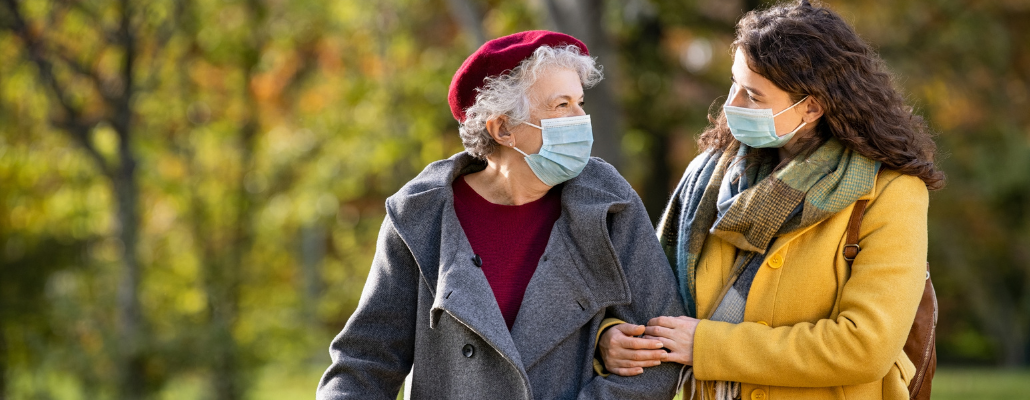Strippel Series Tackles Inequities in Pandemic Response


As the COVID-19 pandemic enters its second year, and vaccines are gradually rolling out, researchers have reported troubling disparities when it comes to underrepresented populations. So when it came time to choose a theme for this year's Robert E. Strippel Memorial Fund for Continuing Dialogue on Justice and Human Rights Annual Program, the coronavirus response of the state of Ohio came into focus.
Robert Strippel, for whom the fund is named, served the Miami University community for over fifteen years (1958-1974), and he was Miami’s Coordinator of Volunteer and Religious Programs at the end of his career. He had a life-long commitment to human rights and social justice, and was active in helping to organize the Freedom Summer ‘64 Training at the Western College for Women. His wife, Jane Strippel, organized fundraising in his memory and still consults with the Strippel Fund Committee.
The Fund’s programming is organized by the Strippel Fund committee, comprised of students, faculty and staff, community members/activists, and alumni. The committee organizes programming on social, economic, and environmental issues that are timely and perhaps not being covered as visibly on and off campus. Staff from Global Initiatives and the Center for American and World Cultures are proud to provide an administrative and digital home for this vital programming.
A Theme of Social Justice Leadership

Jacqueline Daugherty
According to planning committee chair Dr. Jacqueline Daugherty, ever since last spring’s lockdown, the Strippel Fund Committee decided that it wanted to focus on the pandemic for this year. "At the same time, we decided to organize the next three years of Strippel programming under the big umbrella of Social Justice Leadership in order to create dialogue on campus about what it is and how each of us can lead in this way," she said.
As more information became available on COVID-19’s disproportionately negative impact on poor, elderly, disabled, and communities of color, it became obvious to the committee that they needed to use this platform to provide social justice leadership perspectives on how to ensure equitable access to healthcare and other resources in communities hardest hit by COVID-19.
Spring programming has been developed under the theme of "The Responsibility to Act: Health Equity and & Social Justice Leadership Series." Each panel is about a different level of COVID-19 impact and response. The first panel covered the state policy infrastructure response. The second panel covered the response of local community organizations, who serve members of groups who are especially vulnerable to COVID-19 infection/serious illness/death. The third panel focuses on the lived experiences of members of these disproportionately impacted groups and their family.
Creativity and Inspiration
Daugherty, the acting director of the Western Center for Social Impact and Innovation, was blown away by the stories shared in the inaugural panel, Building Collective Social Responsibility: COVID-19 Pandemic and the Overrepresentation of Underrepresented Ohioans. "Both panelists have leadership positions in state policy-making infrastructure. These were stories of creativity of the panelists and the communities within which they work, as they described case after case of ways in which Ohio was behind the curve on COVID-19 outreach to racial and ethnic minoritized communities and how they addressed the gaps," she said.
Later, a student who attended the panel expressed the relief and inspiration the talk brought her. "She both didn't know that the kind of work they are both doing at the state level was happening, and she felt a sort of call to action to ensure it continues," Daugherty said.
"Professionally, I learned a great deal from them. I plan on using some of the examples they discussed on how COVID forced the state to respond quickly and effectively to the needs of marginalized communities in my future classes," she said.
All Strippel events are free, open to the public, and currently virtual. Anyone who wants to learn about how to effectively address the challenges that minoritized communities face with COVID-19 is invited to attend.
The Spring 2021 series concludes on April 6 (see sidebar.) For more information about the Robert E. Strippel Memorial Fund and future programming, visit MiamiOH.edu/Strippel.
Next Program
COVID-19 Pandemic: Structural factors that impact high risk group experiences
The Responsibility To Act: Health Equity and Social Justice Leadership
Panel discussion and dialogue
Kathie Brinkman, Oxford Community Member
Assisted Living/Nursing Home Residents: A Family Perspective
Courtney Hineman, Speak-Up Self-Advocacy Program, Butler County Board of Developmental Disabilities
A Disability Perspective
Special thanks to Strippel's wonderful campus and community partners: Miami’s Center for American and World Cultures, Ohio Department of Health, Butler County Board of Developmental Disabilities, Ohio Commission on Hispanic and Latino Affairs, Oxford Citizens for Peace and Justice, and our media partner, MujerLatinaToday.

